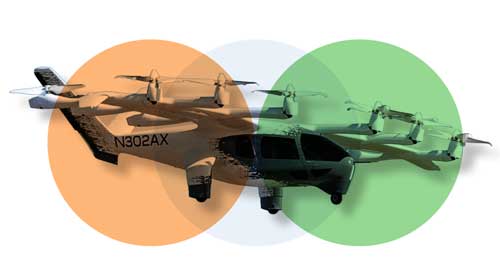INDIAN ARMED FORCES CHIEFS ON OUR RELENTLESS AND FOCUSED PUBLISHING EFFORTS

The insightful articles, inspiring narrations and analytical perspectives presented by the Editorial Team, establish an alluring connect with the reader. My compliments and best wishes to SP Guide Publications.

"Over the past 60 years, the growth of SP Guide Publications has mirrored the rising stature of Indian Navy. Its well-researched and informative magazines on Defence and Aerospace sector have served to shape an educated opinion of our military personnel, policy makers and the public alike. I wish SP's Publication team continued success, fair winds and following seas in all future endeavour!"

Since, its inception in 1964, SP Guide Publications has consistently demonstrated commitment to high-quality journalism in the aerospace and defence sectors, earning a well-deserved reputation as Asia's largest media house in this domain. I wish SP Guide Publications continued success in its pursuit of excellence.
Proceed but with Caution
With growing congestion in major cities of India, the need for efficient transportation solutions & electric air taxi services have the potential to revolutionise urban transportation

Urban Air Mobility (UAM) is rapidly gaining traction in India, as forward-thinking companies seek to address the challenges posed by population density and congestion through innovative solutions. The potential for electric Vertical Takeoff and Landing (eVTOL) aircraft is particularly promising in this context. Recent announcements by key players underscore the emergence of India as a significant market for UAM initiatives.
Earlier this month, InterGlobe Enterprises, the parent company of IndiGo, announced plans to launch an all-electric taxi air service in India in partnership with Archer, a US-based eVTOL aircraft-maker. The service aims to improve urban mobility by providing a low-noise, sustainable, and cost-competitive alternative to ground transportation. A leading California-based electric air taxi company, Archer Aviation, is backed by the likes of Boeing, United Airlines and auto major Stellantis. The partnership plans to finance the purchase of up to 200 of Archer’s electric vertical take-off and landing (eVTOL) aircraft — Midnight — for the India operations.
Also in November 2023, Eve Air Mobility (EAM), a subsidiary of Brazilian aerospace giant Embraer, and Hunch Mobility, a joint venture between Hunch Ventures and Blade Air Mobility have announced that the two companies are working together to bring first electric commuter flights to Bengaluru, India. With the announcement, Bengaluru becomes the launch city in the region for urban air mobility flights utilising electric vertical takeoff and landing (eVTOL) aircraft. Eve’s eVTOL will offer Hunch Mobility’s customers a quick and economical way to avoid traffic congestion in one of the world’s most dense urban environments. Eve’s eVTOL is 100 per cent electric and has a range of 100 kilometers (60 miles) allowing it to complete a variety of urban air mobility missions in Bengaluru. The aircraft features a lift + cruise configuration with dedicated rotors for vertical flight and fixed wings to fly on cruise, with no components required to change position during flight. It will be piloted at launch but evolving towards uncrewed operations in the future. Eve’s eVTOL is scheduled to enter into service in 2026.
Electric air taxi services have the potential to revolutionise urban transportation in India, providing a sustainable and efficient solution to the growing challenges of congestion and pollution. In addition to a new, efficient transportation option, eVTOL flights are expected to have a positive economic impact on the community including new employment opportunities. Positions ranging from pilots and aircraft service technicians to training and technical services are among the numerous roles that will be needed as eVTOL flights are introduced and expand. The development of the necessary infrastructure to support eVTOL operations is also expected to contribute value and employment opportunities to the community. As partnerships unfold between eVTOL developers, airlines, and government agencies, the growing importance of sustainable and efficient transport solutions is highlighted. The joint effort to promote local manufacturing and personnel training demonstrates the commitment to advancing India’s UAM ecosystem.
Amid the excitement surrounding these pioneering endeavours, there are a number of challenges that need to be addressed in order to implement electric air taxi services effectively, efficiently, and safely. These challenges include:
- Technology Development: eVTOL aircraft are a new technology, and there are still some challenges that need to be addressed before they can be deployed on a large scale. For example, the cost of batteries needs to be reduced and the range of eVTOL aircraft needs to be increased.
- Safety: Safety is the top priority for any new transportation system. eVTOL aircraft will need to be thoroughly tested and certified before they can be put into commercial operation.
- Public Acceptance: The public will need to be convinced that eVTOL taxi services are safe and reliable before they will be willing to use them. This may require a public awareness campaign and education about the benefits of UAM.
One of the key advantages of UAM is that it can help to alleviate traffic congestion and reduce emissions in urban areas. eVTOL aircraft can fly over traffic jams and take off and land in small spaces, making them ideal for short-distance trips. They are also electric-powered, so they produce zero emissions. However, in order to be effective, efficient, and safe, electric air taxi services will need to ensure that they have proven technology, are a safe mode of transportation and are a convenient, accessible and affordable air mobility solution.
A prudent approach is essential, ensuring careful consideration of critical factors such as infrastructure development, regulatory framework, and public safety. The aviation industry and government regulators must work together to develop a robust regulatory framework and ensure the safe and efficient operation of electric air taxi services. By carefully considering these critical factors, India can position itself as a first mover and an early adapter of this transformative technology.





